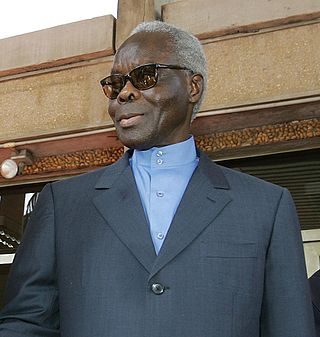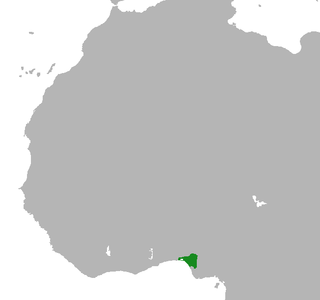Samou Seidou Adambi is a Beninese politician. He is the Minister of Energy, Water and Mines of Benin. [1] He is the former mayor of the commune and city of Parakou [ when? ]. [2]
Samou Seidou Adambi is a Beninese politician. He is the Minister of Energy, Water and Mines of Benin. [1] He is the former mayor of the commune and city of Parakou [ when? ]. [2]

Benin, officially the Republic of Benin, and also known as Dahomey, is a country in West Africa. It is bordered by Togo to the west, Nigeria to the east, Burkina Faso to the north-west, and Niger to the north-east. The majority of its population lives on the southern coastline of the Bight of Benin, part of the Gulf of Guinea in the northernmost tropical portion of the Atlantic Ocean. The capital is Porto-Novo, and the seat of government is in Cotonou, the most populous city and economic capital. Benin covers an area of 114,763 km2 (44,310 sq mi), and its population in 2021 was estimated to be approximately 13 million. It is a small, tropical country. It is one of the least developed, with an economy heavily dependent on agriculture, and is an exporter of palm oil and cotton. Some employment and income arise from subsistence agriculture.

Mathieu Kérékou was a Beninese politician who served as president of the People's Republic of Benin from 1972 to 1991 and the Republic of Benin from 1996 to 2006.

Parakou is the largest city in northern Benin, and the third-largest city in the country, with an estimated population of around 206,667 people, and capital of the Borgou Department. Administratively the commune of Parakou makes up one of Benin's 77 communes. Since 2015, its mayor is Souradjou Adamou Karimou.
Seïdou Mama Sika was the Minister of the Interior of Benin from February 9, 2005 until April 2006. He attended the Lycée Technique in Coulibaly. He became an air brigade general in 1999.

The People's Republic of Benin was a socialist state located in the Gulf of Guinea on the African continent, which became present-day Benin in 1990. The People's Republic was established on 30 November 1975, after the 1972 coup d'état in the Republic of Dahomey. It effectively lasted until 1 March 1990, with the adoption of a new constitution, and the abolition of Marxism–Leninism in the nation in 1989.
Juju or ju-ju is a spiritual belief system incorporating objects, such as amulets, and spells used in religious practice in West Africa by the people of Nigeria, Benin, Togo, Ghana, and Cameroon. The term has been applied to traditional Western African religions, incorporating objects such as amulets, and spells used in spiritual practices, and blood sacrifices. This is under the belief that two vessels that have been in close physical contact with each other have similar spiritual properties and in turn, makes the objects possible to manipulate.
Moussa Okanla was a Beninese scholar and diplomat. Okanla was appointed Minister of Foreign Affairs in the government named on 17 June 2007, and was replaced by Jean-Marie Ehouzou on 22 October 2008.

The Republic of Dahomey, simply known as Dahomey, was established on 4 December 1958, as a self-governing colony within the French Community. Prior to attaining autonomy, it had been French Dahomey, part of the French Union. On 1 August 1960, it attained full independence from France.

The following outline is provided as an overview of and topical guide to Benin:
Benin is a coastal country located in the Gulf of Guinea in Western Africa, which is a resource rich region. Energy in Benin has a diverse energy mix and takes several forms including: solar, wind, hydropower, biomass, fossil resources, and mineral resources. Out of this energy mix, about 60% of energy comes from biomass. Benin is also dependent on energy imports from Ghana and Côte d'Ivoire. While power plants and other energy facilities were built in the 1950s and 1960s, the lack of investment has led to deterioration over time. Similarly, its location in the Gulf of Guinea has led to an attempt of oil production starting in the late 1980s. However, due to unprofitable operations, oil production halted in 1998.
Benin, officially the Republic of Benin, is a country in Western Africa. It borders Togo to the west, Nigeria to the east and Burkina Faso and Niger to the north; its short coastline to the south leads to the Bight of Benin. Its size is just over 110000 km2 with a population of almost 8500000. Its capital is the Yoruba founded city of Porto Novo, but the seat of government is the Fon city of Cotonou. About half the population live below the international poverty line of US$1.25 per day.

The Kingdom of Benin, also known as the Edo Kingdom or Benin Kingdom, is a kingdom within what is now southern Nigeria. It has no historical relation to the modern republic of Benin, which was known as Dahomey from the 17th century until 1975. The Kingdom of Benin's capital was Edo, now known as Benin City in Edo State, Nigeria. The Benin Kingdom was "one of the oldest and most developed states in the coastal hinterland of West Africa". It grew out of the previous Edo Kingdom of Igodomigodo around the 11th century AD, and lasted until it was annexed by the British Empire in 1897.

Edson Seidou is a French professional footballer who plays as a defender for Ligue 2 club Laval.

Wayne E. Neill is an American retired diplomat who served as the United States Ambassador to Benin from 2003 to 2006.
Séidou Barazé Guéro is a Beninese professional footballer who plays for SC Schiltigheim and the Benin national football team.

The 1972 Dahomeyan coup d'état was a military coup staged on 26 October 1972 by Major Mathieu Kérékou, who took control of the Republic of Dahomey and ended a system of government established following the annulled 1970 presidential election, in which three members of the Presidential Council were to rotate in power. Ahomadégbé-Tomêtin served as the Chairman at the time of the coup.
The Cabinet of Benin is appointed by the President of the Republic and is subject to the opinion of the Bureau of the National Assembly.
Alassane Seidou is a Beninese politician and educator. He is the current Minister of Interior and Public Security of Benin, and former Minister of Decentralization and Local Governance, having been appointed to the latter position in early 2021 by the current president of Benin, Patrice Talon. His term began on 25 May 2021.
Seidou is both a given name and a surname. Notable people with the name include: